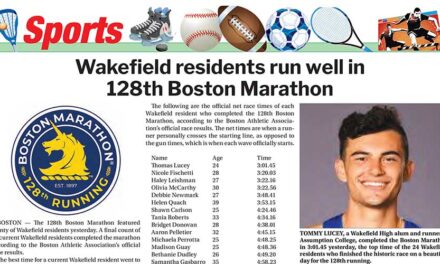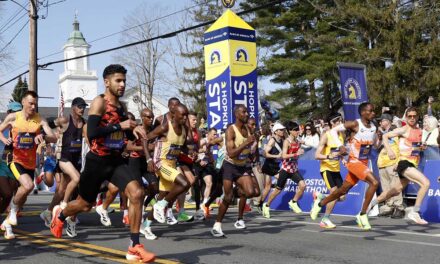Published in the August 31, 2015 edition
FRANKLIN — The Massachusetts Interscholastic Athletic Association announced a new initiative on Aug. 26 entering into partnership with former Revolution star Taylor Twellman’s foundation, Think Taylor, and soccer equipment company INARIA to introduce Concussion Awareness Week.
The initiative is aimed at better educating soccer players, parents, coaches and trainers on concussion injuries and proper treatment and will take place at all MIAA schools hosting boys’ and girls’ soccer games during the week of Sept. 21-25.
Those schools will be encouraged to paint their fields orange and be given special balls, wristbands, scarves and information tags for each player’s equipment bags aimed at raising awareness.
“We need concussion awareness, recognition, education,” said Twellman, now the lead soccer analyst for ESPN. “At ThinkTaylor, we call it the care program and it’s real simple. If we can change three things — the awareness, the recognition and the education — then we’re going to make a difference.”
While this program is soccer-specific, the issue of concussions and traumatic brain injury extends across all sports.
“This is an opportunity and when folks come to the table and ask to participate in a partnership that we assess will make a significant difference, we jump on it,” said MIAA executive director Bill Gaines. “Regardless of that, we have a responsibility as an association to continually reflect upon current standards and expectations vis a vis rules in all sports. We do have in place a sports medical committee and that committee continually are recommending more changes for the benefit of our student-athletes.
“We have a universal issue but this is an opportunity to make a significant positive change and address problems in a particular sport community.”
Twellman added, “I don’t care if you’re skateboarding, horseback riding, gymnastics, cheerleading or playing football. I get as many phone calls from football athletes as I do from soccer athletes. We’re equipped as a foundation to direct you to the right people, the doctors, to do the right thing. If another state comes to us and says men’s and women’s ice hockey, we want to do this, we’ll do it.”
Twellman noted he took and passed more than 70 baseline tests after suffering his concussion on Aug. 30, 2008 but was still unable to resume his career.
“The hardest thing for athletes to understand is honesty on this injury is the most important thing,” he said. “If a doctor looks you in the eye and says you’re fine but in your heart and in your head you don’t feel right, then you have to speak up. That’s where I think it’s changed from 2008 to 2015. The moment the athlete is honest and says something, I think we have more people around him saying you have to sit out where in 2008, it was suck it up. I don’t think it happens as much, but it’s still happening.”




